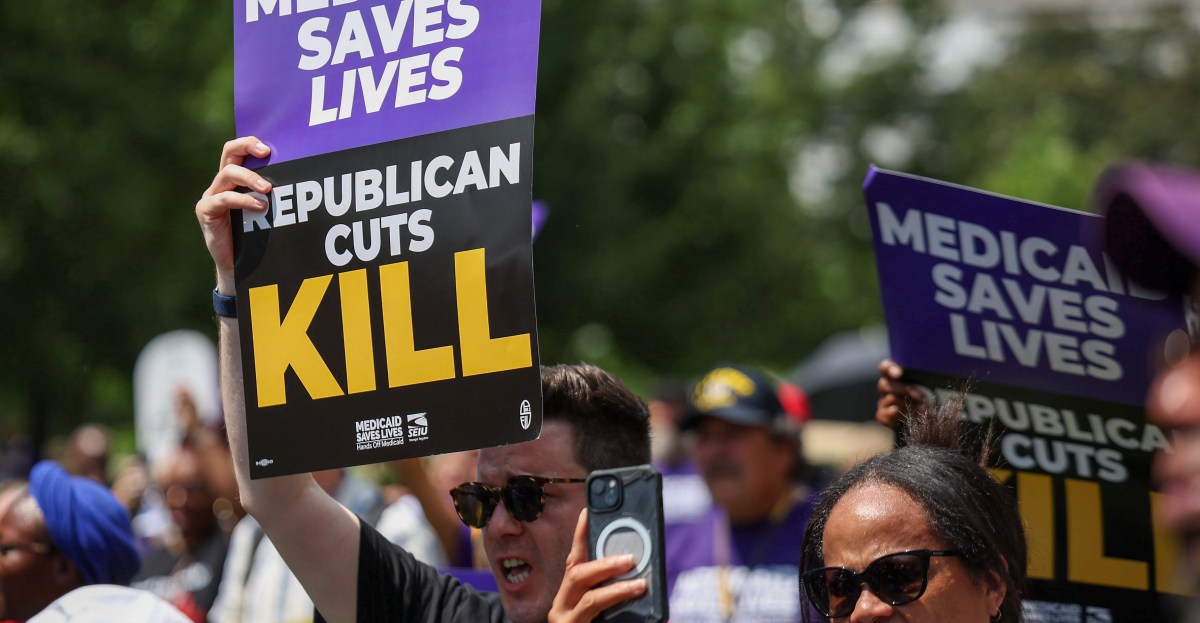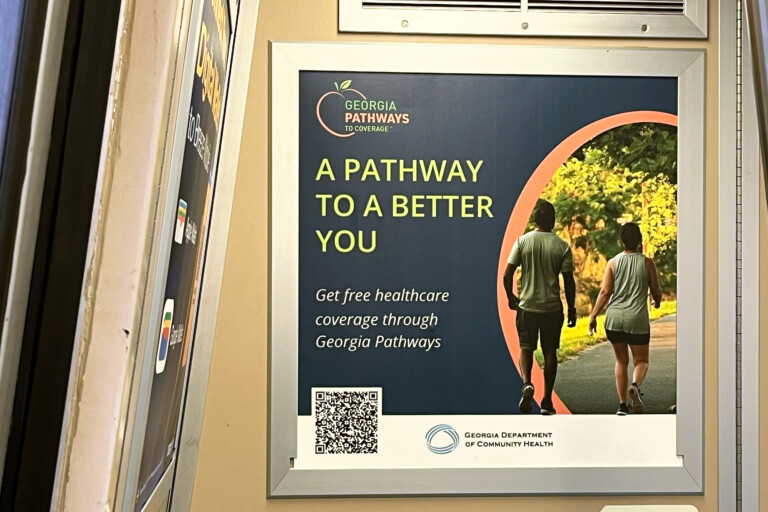The wrong lesson to take from Trump’s gutting of Medicaid
Last week, the Senate passed the largest cut to America’s welfare state in modern history. President Donald Trump’s inaptly named “One Big Beautiful Bill” would take health insurance from 11.8 million Americans and slash food assistance to low-income families by about $100 a month.
In the face of this unprecedented setback, some progressives argue that the Democratic Party must rethink its entire approach to social welfare policy.
Over the past half-century, Democrats have expanded the welfare state primarily through means-tested programs — benefits that are reserved for Americans below a certain income threshold. The left has long criticized this model, arguing that the party should instead pursue universal programs, which is to say, programs that don’t screen beneficiaries by affluence (for example, Social Security provides pensions to all senior citizens with a sufficient work history, irrespective of their wealth, making the program “universal” in this sense of the term). After all, such policies require less bureaucracy to administer, more reliably reach their intended beneficiaries, and don’t punish people for getting a raise (unlike some means-tested programs, which can abruptly cut off benefits to a person whose income rises).
In my view, these substantive arguments for favoring universal benefits over means-tested ones are strong. But debate on this subject tends to focus on political considerations. After all, a policy that is optimally designed — but legislatively nonviable — helps no one.
Many proponents of means-tested programs recognize their flaws but insist that such policies are the most politically sound way of aiding the disadvantaged in the United States. The American public’s tolerance for higher taxes or deficits is limited (at least, in today’s context, when higher deficit spending is liable to push up inflation or interest rates). As a result, the politicians who make or break Democratic majorities — which is to say, the lawmakers who win tight races in purple areas — have historically had a limited appetite for new social spending. Given that reality, some argue that the most effective way to combat inequality and disadvantage in the US is by targeting social benefits at the needier segments of the population.
But progressives have countered that this is politically myopic. In their account, means-tested programs are more vulnerable to repeal than universal ones, which boast the buy-in of more powerful segments of society. Republicans are constantly trying to cut benefits for the poor, but tend to be warier about slashing Medicare and Social Security. If what one truly cares about is expanding the welfare state in a politically durable manner, this reasoning goes, you should make new benefits universal — even if that entails a higher upfront fiscal cost.
Some in this camp have cast Trump’s bill as vindication of their analysis. After all, the president’s legislation cuts means-tested programs like Medicaid and food stamps, yet spared Medicare and Social Security. Therefore, in the long run, universal benefits are actually more politically sound than the alternative.
But I don’t think this follows, for at least two reasons:
First, it’s not clear that Medicare and Social Security evaded cuts because they are universal. Rather, benefits for the elderly may boast unique political strengths, which are not shared by all universal programs. And the longer-term history of American social policy supports this interpretation. Politically, universality does not appear to be the key determinant of a policy’s survival or growth.
Second, even if universal programs are more politically resilient once established, they could still be more challenging than means-tested policies to create in the first place.
Perhaps, Democrats should put optimal policy above political expediency. As Republicans just demonstrated, parties can enact divisive policies with slim congressional majorities, if they really want to. The next Democratic government could likewise choose to enact large tax increases for the sake of funding new universal programs. But the strongest arguments for that course of action are substantive, not political.
Universality does not guarantee political strength
To discern whether means-tested programs have been uniquely vulnerable to cuts in the United States, it’s worth looking at long-term trends. And when we examine the events of the past few decades — rather than those of the past few days — universal policies’ political superiority looks uncertain.
For one thing, Republicans have in fact cut some universal programs quite a bit over the past half century. Under Ronald Reagan, Congress cut Social Security benefits substantially by raising the retirement age. And subsequent governments have repeatedly enacted cuts to Medicare, although these have been concentrated on providers and not beneficiaries. It remains true that America’s elder benefits have held up remarkably well against cuts, given their ballooning costs. But even these programs have not been wholly immune to attack.
The trajectory of unemployment insurance (UI) is more telling. UI is a universal program, benefiting all Americans who lose their jobs, regardless of their former incomes or current wealth. Yet the federal government cut UI benefits in the 1980s, and many states slashed funding further in the 2010s. Throughout the latter decade fewer than 30 percent of America’s unemployed received benefits in an average month, down from 41 percent in 1979.
On the other hand, since Reagan’s election, means-tested social benefits have actually grown substantially. Even as Social Security benefits fell over the course of the 1980s, America’s average monthly food assistance payment rose by 10 percent, while eligibility for Medicaid expanded. Between 1990 and 2019, meanwhile, access to Medicaid grew dramatically, as did the average benefit from the Earned Income Tax Credit. Altogether, between 1979 and 2019, spending on targeted welfare programs grew by 280 percent, after accounting for inflation and population growth, according to an analysis by Robert Greenstein, founder of the Center on Budget and Policy Priorities. (A significant portion of that growth can be attributed to rising healthcare costs, which have mechanically pushed up spending on Medicaid. But such inflation does not explain anywhere close to the full growth of social spending over the period. And in any case, it is notable that, until this year, the government agreed to eat these cost increases, rather than responding to them by reducing Medicaid benefits or eligibility.)
Courtesy of the Hamilton Project
To be sure, some means-tested programs suffered cuts or full repeal during this period. Most notably, under Bill Clinton, Congress ended Aid to Families with Dependent Children. However, on the net, targeted anti-poverty spending has grown massively over the past half-century. And this translated into lower poverty: In 1993, America’s tax and transfer system reduced its poverty rate by 21 percent; in 2019, taxes and transfers cut the poverty rate by 47 percent.
This history should inform how we interpret the One Big Beautiful Bill Act’s social welfare cuts. It’s undoubtedly true that Republicans have proven more skittish about cutting Medicare and Social Security than many means-tested programs. But since the GOP has been quite willing to slash unemployment insurance in recent years, it’s not clear that Medicare and Social Security’s political strength derives from their universality. Rather, those programs might owe their resilience to the facts that:
- They are both tied to a beneficiary’s work history and are therefore perceived as “earned.”
- They benefit the elderly, who Americans widely regard as deserving of social support, due to their relative difficulty in working.
- Older Americans vote at highly disproportionate rates, which makes it riskier to cut benefits earmarked for them specifically.
This interpretation of Medicare and Social Security’s political strength is consistent with the GOP’s recent cuts to benefits for the jobless and decision to slash Medicaid through the expansion of work requirements: Aid to prime-age Americans who are perceived as choosing not to work is more vulnerable than benefits for senior citizens who purportedly “earned” them through a lifetime of labor.
Even if universal programs are more resistant to repeal, they’re still more difficult to establish
All this said, it still seems plausible to me that universal programs are somewhat more politically secure — once established — than means-tested ones. At the very least, social benefits that are narrowly tailored to the very poorest have not fared especially well. Even Robert Greenstein, whose work challenges the political case for universality, argues that policies that serve both the poor and a “sizable share of the middle class” tend to be on stabler footing than programs that serve the indigent alone.
But the fundamental challenge facing Democrats is how to establish new social benefits in the first place. Raising taxes in the United States is politically difficult, and has been for virtually our entire history outside of wartime. As Matt Yglesias notes, federal tax revenues surged as a share of GDP with America’s entry into World War II, but have never increased all that much since then.
Courtesy of Federal Reserve Economic Data
Trump’s bill will only increase the political headwinds facing new spending. Democrats have forsworn any tax increases on voters earning less than $400,000 in recent years. Now, Trump has lowered the baseline rate of taxation on this vast group, reducing the funds available to a future Democratic government in the absence of tax increases. The president’s legislation also swells the debt, thereby reducing the likelihood that future lawmakers will have lots of room to deficit spend without risking inflation or interest rate hikes.
So long as Americans remain averse to large tax increases, Democratic candidates who win narrow elections in swing districts are likely to resist large increases in social spending. To the extent that Democrats need such candidates to secure congressional majorities, the pool of financing available for social welfare spending is liable to be fixed. And as long as that’s true, there will be a political argument for means-testing new programs.
To be sure, some universal benefits are relatively affordable — we don’t need large middle-class tax hikes to provide all schoolchildren with free lunch. But other programs, such as a monthly child allowance, are quite expensive to provide on a universal basis. It may therefore be more politically viable to expand child benefits for poor and lower-middle-class families than for American households writ large.
You can just do things
Of course, to some extent, political viability is in the eye of the office-holder. We just saw Republican House members from swing districts vote for politically toxic Medicaid cuts. Given that parties almost always suffer big midterm losses no matter what they do, maybe the next Democratic government should emulate the GOP’s boldness and fund large, universal welfare programs with middle-class tax hikes, backlash be damned.
There are reasons to be wary of this logic. One lesson of the past few months is that keeping the Republican Party out of power is extremely important. Another is that the GOP can’t be trusted to preserve even popular, broadly beneficial social programs. It’s worth mentioning that Medicaid is a beloved program that enjoys an 83 percent approval rating.
Given these realities, it’s hard to be certain that Democrats can do more lasting good by worrying less about retaining power once they acquire it.
Still, the substantive case for favoring universal programs over means-tested ones is strong.
For one thing, universal policies are easier for the government to administer and for beneficiaries to claim. Imagine a world where only people who earned less than $50,000 a year were entitled to borrow books from libraries. The burden of needing to prove one’s eligibility would likely deter some individuals from bothering to take out books, while libraries would need to spend a lot of time and money on verifying borrowers’ incomes, increasing their administrative costs per book lent.
These same pathologies plague many actual means-tested programs. People who are eligible for anti-poverty benefits routinely fail to claim them. This problem is so widespread that, if everyone who qualified for public benefits received their due, poverty would decline by more than 30 percent in the US, according to an Urban Institute report.
So, there are some good reasons for Democrats to favor universalistic welfare programs. But these have less to do with means-testing’s supposed political flaws than its policy downsides.





